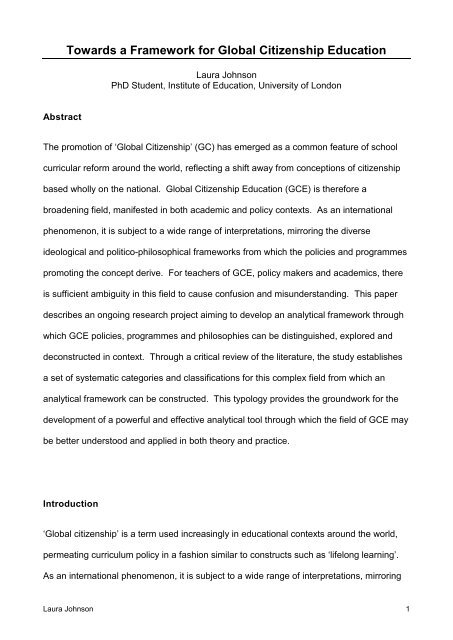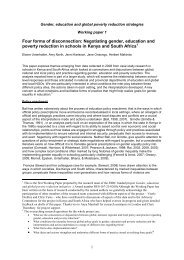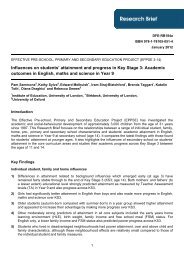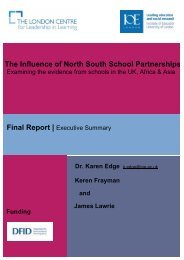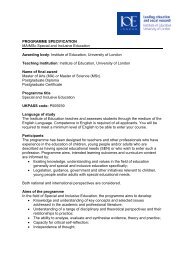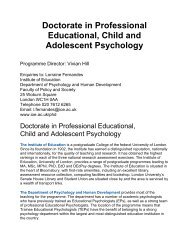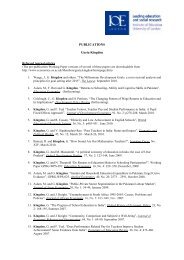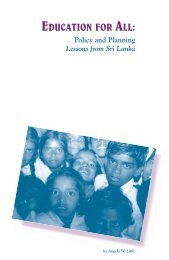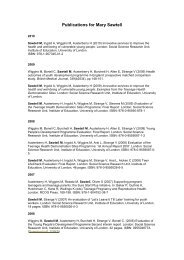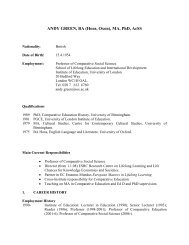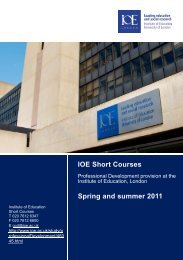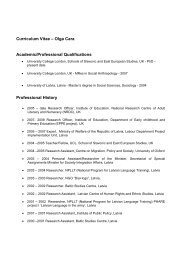Towards a Framework for Global Citizenship Education - Institute of ...
Towards a Framework for Global Citizenship Education - Institute of ...
Towards a Framework for Global Citizenship Education - Institute of ...
Create successful ePaper yourself
Turn your PDF publications into a flip-book with our unique Google optimized e-Paper software.
Abstract<br />
<strong>Towards</strong> a <strong>Framework</strong> <strong>for</strong> <strong>Global</strong> <strong>Citizenship</strong> <strong>Education</strong><br />
Laura Johnson<br />
PhD Student, <strong>Institute</strong> <strong>of</strong> <strong>Education</strong>, University <strong>of</strong> London<br />
The promotion <strong>of</strong> „<strong>Global</strong> <strong>Citizenship</strong>‟ (GC) has emerged as a common feature <strong>of</strong> school<br />
curricular re<strong>for</strong>m around the world, reflecting a shift away from conceptions <strong>of</strong> citizenship<br />
based wholly on the national. <strong>Global</strong> <strong>Citizenship</strong> <strong>Education</strong> (GCE) is there<strong>for</strong>e a<br />
broadening field, manifested in both academic and policy contexts. As an international<br />
phenomenon, it is subject to a wide range <strong>of</strong> interpretations, mirroring the diverse<br />
ideological and politico-philosophical frameworks from which the policies and programmes<br />
promoting the concept derive. For teachers <strong>of</strong> GCE, policy makers and academics, there<br />
is sufficient ambiguity in this field to cause confusion and misunderstanding. This paper<br />
describes an ongoing research project aiming to develop an analytical framework through<br />
which GCE policies, programmes and philosophies can be distinguished, explored and<br />
deconstructed in context. Through a critical review <strong>of</strong> the literature, the study establishes<br />
a set <strong>of</strong> systematic categories and classifications <strong>for</strong> this complex field from which an<br />
analytical framework can be constructed. This typology provides the groundwork <strong>for</strong> the<br />
development <strong>of</strong> a powerful and effective analytical tool through which the field <strong>of</strong> GCE may<br />
be better understood and applied in both theory and practice.<br />
Introduction<br />
„<strong>Global</strong> citizenship‟ is a term used increasingly in educational contexts around the world,<br />
permeating curriculum policy in a fashion similar to constructs such as „lifelong learning‟.<br />
As an international phenomenon, it is subject to a wide range <strong>of</strong> interpretations, mirroring<br />
Laura Johnson 1
the diverse ideological and politico-philosophical frameworks from which the policies and<br />
programmes promoting the concept derive. The term „global citizenship education‟ is also<br />
entwined with a large number <strong>of</strong> overlapping educational arenas including development<br />
education, education <strong>for</strong> cosmopolitan citizenship, peace education and human rights<br />
education. Consequently, the term is <strong>of</strong>ten used with a sense <strong>of</strong> ambiguity <strong>for</strong> its meaning,<br />
which can potentially cause disjunctures between intention and practice <strong>for</strong> teachers <strong>of</strong><br />
GCE, policy makers and academics. This paper aims to deconstruct the concept <strong>of</strong> „global<br />
citizenship‟ according to its academic interpretations. Through a critical review <strong>of</strong> the<br />
literature, I establish a set <strong>of</strong> systematic categories and classifications <strong>for</strong> this complex<br />
field from which an analytical framework <strong>for</strong> global citizenship education can be<br />
constructed.<br />
The initial typology developed within this paper is constructed through an inductive<br />
analysis <strong>of</strong> academic literature, focusing principally on texts relating to global citizenship<br />
but also to some literature specifically within the educational field. The analysis loosely<br />
follows McCracken‟s (1988) „five stages <strong>of</strong> analysis‟, converting the stages into an iterative<br />
process through which observations and relationships in academic texts are explored and<br />
combined into themes and categories which will ultimately <strong>for</strong>m the analytical framework.<br />
The following sections summarise and illustrate the categories identified within this<br />
typology <strong>for</strong> global citizenship.<br />
Conflicting and converging <strong>for</strong>ms <strong>of</strong> cosmopolitan global citizenship<br />
The term „cosmopolitanism‟ has seen a recent resurgence in popularity, due to its<br />
appropriation by scholars such as Nussbaum (1996), Appiah (2006) and, in the education<br />
field, Osler and Starkey (2008). Often couched within a framework <strong>of</strong> human rights,<br />
Laura Johnson 2
cosmopolitanism is regarded by a number <strong>of</strong> critical post-development and post-colonial<br />
scholars as a neo-imperial <strong>for</strong>m <strong>of</strong> global citizenship since its universalist perspective (the<br />
notion that all human beings share the same fundamental values) is rooted within a set <strong>of</strong><br />
institutions and practices that are said to be West-centric (Arneil, 2007; Tully, 2008).<br />
However, as Humes (2008, p. 43) acknowledges, there are significant pragmatic<br />
advantages to the cosmopolitan position:<br />
“Some writers deplore the trend towards what they describe as a globally<br />
connected political and bureaucratic elite which determines priorities <strong>for</strong> the rest<br />
<strong>of</strong> the world. Others take a more positive view <strong>of</strong> political globalisation and see<br />
it (potentially at least) as bringing some <strong>of</strong> the benefits <strong>of</strong> advanced<br />
democracies to nations which are ruled by undemocratic systems <strong>of</strong><br />
government. One thinks, <strong>for</strong> example, <strong>of</strong> the United Nations Convention on the<br />
Rights <strong>of</strong> the Child. The spread <strong>of</strong> awareness <strong>of</strong> the principles enshrined in<br />
such documents, it is argued, puts pressure on oppressive regimes and gives<br />
hope to those who suffer from various <strong>for</strong>ms <strong>of</strong> political persecution.”<br />
(Humes, 2008, p. 43)<br />
The word „cosmopolitanism‟ itself derives from Ancient Greek ideas <strong>of</strong> universality, where<br />
the „cosmos‟ (universe / world) is one‟s „city‟ (living place / community). Peters, Blee and<br />
Britton (2008) identify three „types‟ <strong>of</strong> cosmopolitan global citizenship: moral, political and<br />
economic. While these three categories are useful, they omit a notable conception <strong>of</strong><br />
cosmopolitan global citizenship described by Waks (2008, p. 204) as ‘aesthetic-cultural<br />
cosmopolitanism’, which, he suggests, represents “a kind <strong>of</strong> multi-national sophistication”.<br />
Within a range <strong>of</strong> the literature under scrutiny, these four categories <strong>of</strong> cosmopolitanism<br />
demonstrate elements <strong>of</strong> convergence and all overlap to some extent, but there are also<br />
Laura Johnson 3
significant areas <strong>of</strong> conflict between each. The following sections summarise these areas<br />
<strong>of</strong> convergence and conflict.<br />
Political cosmopolitan global citizenship<br />
Three main styles <strong>of</strong> thinking pervade political cosmopolitan global citizenship. The first is<br />
what one might term a „radical‟ conception <strong>of</strong> political-institutional global citizenship, in<br />
which the idea <strong>of</strong> a „world state‟ is conceived which does away with current nation-state<br />
boundaries and transfers sovereignty to a democratic world polity with legislative,<br />
executive and judicial powers, including a “monopoly on the legitimate use <strong>of</strong> organized<br />
violence” (Wendt, 1999, p. 202). This idea is advocated by some scholars as a utopian<br />
but currently impossible ideal (<strong>for</strong> example, Carter, 2001; Dewey, 1918/1982; Heater,<br />
2002; Shaw, 2000; Singer, 2004), and by a small minority even as a real possibility (<strong>for</strong><br />
example, Wendt, 2003). The dream <strong>of</strong> a world government abolishing nation-state<br />
sovereignty and instituting a <strong>for</strong>mal status <strong>for</strong> all human beings <strong>of</strong> „world citizenship‟ is<br />
criticised by many intellectuals as being unfeasible, undesirable and unnecessary (Lu,<br />
2008).<br />
The second <strong>for</strong>m <strong>of</strong> political cosmopolitan global citizenship rejects the idea <strong>of</strong> a world<br />
state and is thus characterised as a weaker, less radical <strong>for</strong>m <strong>of</strong> global governance<br />
involving democratisation and strengthening <strong>of</strong> current international institutions such as the<br />
United Nations, World Trade Organisation and World Bank into a “well-ordered world<br />
society” (Pogge, 1989, p. 216). This is <strong>of</strong>ten referred to as a <strong>for</strong>m <strong>of</strong> „cosmopolitan<br />
democracy‟, as advocated by Held (1995, 2004), McGrew (1997), Dower (2000, 2003),<br />
Linklater (1998) and Archibugi (2008) among others. However, Tully (2008, p. 23), from a<br />
post-colonial critical perspective, considers this <strong>for</strong>m <strong>of</strong> global citizenship to be an<br />
Laura Johnson 4
extension <strong>of</strong> „Western imperialism‟; and Roman (2004, p. 245) similarly describes<br />
proponents <strong>of</strong> such a conception as “democratic civilizers” engaged in a <strong>for</strong>m <strong>of</strong> “neo-<br />
colonial humanism.” Conversely, proponents <strong>of</strong> cosmopolitan democracy argue that, with<br />
the democratisation <strong>of</strong> the institutions <strong>of</strong> global governance, problems <strong>of</strong> Western power<br />
and dominance will recede and new <strong>for</strong>ms <strong>of</strong> co-operation and global social justice will<br />
emerge (Held, 2004).<br />
The final <strong>for</strong>m <strong>of</strong> political cosmopolitan global citizenship can be termed ‘anarcho-<br />
cosmopolitanism’ (Gabay, 2008). This rests on the argument that a truly „cosmopolitan‟<br />
ethic cannot be adequately embedded within either a world state or within a nation-state<br />
system, and there<strong>for</strong>e that an anarchistic or libertarian socialist society is the best political<br />
system in which to “develop a cosmopolitan ethic that seeks to overcome selfish self-<br />
interest” (Gabay, 2008, p. 198). This mirrors the growth in what is known as ‘global civil<br />
society’, to the extent that the spread across the world <strong>of</strong> not-<strong>for</strong>-pr<strong>of</strong>it and voluntary<br />
networks and organisations with little regard <strong>for</strong> nation-state boundaries could be regarded<br />
as a <strong>for</strong>m <strong>of</strong> anarcho-cosmopolitanism, at least where their aims align with cosmopolitan<br />
values and ideas (see also Herzog, 2004).<br />
Moral cosmopolitan global citizenship<br />
Theories <strong>of</strong> moral cosmopolitanism can be regarded as the foundation <strong>for</strong> dominant<br />
conceptions <strong>of</strong> global citizenship, as they are so pervasive within both academic and policy<br />
discourses. The roots <strong>of</strong> moral cosmopolitanism are commonly located with the Stoics <strong>of</strong><br />
Ancient Greece, and also in the ideas <strong>of</strong> Kant, who “defended and popularised the idea<br />
that human beings belong to a single moral community” (Peters, et al., 2008, p. 3). The<br />
idea <strong>of</strong> a global or world ethic is necessarily universal, in that the moral values expressed<br />
Laura Johnson 5
would need to be accepted by all in order to be truly effective. However, the extent to<br />
which a global ethic owed to all <strong>of</strong> humanity supersedes more local moral, or „special‟<br />
obligations (<strong>for</strong> example, to one‟s family or fellow national citizens), or whether this should<br />
be an issue at all, is controversial. Waks identifies two <strong>for</strong>ms <strong>of</strong> moral cosmopolitan: the<br />
“strong cosmopolitans” such as Nussbaum (1996), Dower (1998), MacIntyre (1981) and<br />
Singer (2004), who argue that special obligations are morally arbitrary and that patriotism,<br />
<strong>for</strong> example, is an unacceptable moral position; and the “new cosmopolitans” such as<br />
Appiah (2006) and Beck (2006) who advocate a <strong>for</strong>m <strong>of</strong> global moral ethics drawn from “a<br />
synthesis <strong>of</strong> liberal universalism and communitarianism” (Waks, 2008, p. 209) in which<br />
special obligations are “ineluctable elements <strong>of</strong> moral life” (Waks, 2008, p. 210) according<br />
to the contexts within which personal narratives are <strong>for</strong>med and „otherness‟ is recognised.<br />
Papastephanou (2008, p. 179) also subscribes to this pragmatic conception, in which she<br />
claims that “particularity is not the opposite <strong>of</strong> universality, as is usually theorised, but<br />
rather a subset <strong>of</strong> it”: <strong>for</strong> example, patriotism, as a moral „particularity‟, can easily co-exist<br />
with ideas <strong>of</strong> a global ethic.<br />
Moral cosmopolitanism is most visibly and famously expressed in the <strong>for</strong>m <strong>of</strong> universal<br />
human rights such as those expressed in the United Nations Universal Declaration <strong>of</strong><br />
Human Rights. Many proponents <strong>of</strong> human rights argue <strong>for</strong> a universal, or “strong<br />
cosmopolitan”, understanding <strong>of</strong> human rights (<strong>for</strong> example, Abdi & Shultz, 2008),<br />
although they are also to an extent compatible with the more communitarian ideas <strong>of</strong> the<br />
„new cosmopolitans‟, since they can be reinterpreted and embedded within local, national<br />
and regional contexts. In contrast, some scholars maintain that human rights do not go far<br />
enough towards a universal global ethic, in that they cannot provide a sufficiently sturdy<br />
foundation on which a system <strong>of</strong> global justice can be built: <strong>for</strong> example, because <strong>of</strong> the<br />
fragile and uncertain „legal personality‟ <strong>of</strong> the United Nations (Navari, 2000) and the lack <strong>of</strong><br />
Laura Johnson 6
emphasis on the limitations <strong>of</strong> natural resources that require interdependence and<br />
sustainable living (and particularly reductions in Western consumption) in order <strong>for</strong> global<br />
social justice to be possible.<br />
Economic cosmopolitan global citizenship<br />
Pogge (2002) argues that the cosmopolitanism position in general encompasses three<br />
elements: individualism, universality and generality. While the presence <strong>of</strong> the latter two<br />
elements in the economic sphere seem uncontroversial, their combination with<br />
individualism ties economic cosmopolitan global citizenship to divisive theories <strong>of</strong><br />
neoliberalism and capitalism, and what Faulks (2000, p. 11) describes as “thin citizenship”.<br />
Richardson (2008, p. 128) depicts this “global imaginary” as one which “is founded on<br />
individualism and neo-liberal economic ideas that suggest that despite superficial<br />
differences individuals have the same fundamental wants and needs, and by serving their<br />
own self-interest, ultimately the interests <strong>of</strong> the planet are also served.” Tied to notions <strong>of</strong><br />
competition, the free market and human capital, neo-liberalism is demonised in a great<br />
number <strong>of</strong> moral cosmopolitan, political cosmopolitan and educational texts <strong>for</strong> its<br />
disregard <strong>for</strong> moral and political cosmopolitan principles, in favour <strong>of</strong> economic growth,<br />
consumption and elitism (<strong>for</strong> example, Bauman, 1998; Falk, 1993; Isin & Wood, 1999;<br />
Roman, 2004; Schattle, 2008a; Szelényi & Rhoads, 2007).<br />
It is inaccurate to state that economic cosmopolitan global citizenship, or „neoliberal‟ /<br />
„corporate‟ global citizenship as it is <strong>of</strong>ten labelled, is entirely blind to moral values and<br />
detached from other, more „humane‟, elements <strong>of</strong> cosmopolitanism. As Schattle (2008b)<br />
identifies, moves towards „corporate social responsibility‟ such as the United Nations<br />
Laura Johnson 7
<strong>Global</strong> Compact in 2000, are increasingly pervasive. Nevertheless, the donations and<br />
philanthropic activities <strong>of</strong> rich multinational corporations are generally regarded with<br />
scepticism: <strong>for</strong> example, they are <strong>of</strong>ten considered a „smokescreen‟ to distract the public<br />
from individualistic and/or corrupt pr<strong>of</strong>it-making schemes destroying communities and the<br />
environment (Tully, 2008). Manifestations <strong>of</strong> corporate social responsibility may also be<br />
perceived (positively or negatively) as ef<strong>for</strong>ts by businesspeople to atone <strong>for</strong> their wealth<br />
and com<strong>for</strong>table lifestyles. The extent to which a neoliberal, consumerist, capitalist society<br />
can co-exist with genuine ef<strong>for</strong>ts to make the world a better place is there<strong>for</strong>e ambiguous.<br />
Aesthetic-cultural cosmopolitan global citizenship<br />
The final <strong>for</strong>m <strong>of</strong> cosmopolitan global citizenship identified in this analysis <strong>of</strong> academic<br />
literature is its aesthetic-cultural <strong>for</strong>m, which is described by Waks (2008) as follows:<br />
“To be cosmopolitan in this sense is to be open to those from other places, take<br />
an interest in their cultural practices, learn about these practices through<br />
reading, travel, and personal contact, and even to shape a personal identity as<br />
a cosmopolitan through such experiences.”<br />
(Waks, 2008, p. 204)<br />
Conceptions <strong>of</strong> aesthetic-cultural cosmopolitan global citizenship can also refer to the<br />
pervasive cultural globalisation <strong>of</strong> media and languages: <strong>for</strong> example the global spread <strong>of</strong><br />
MTV and the internet giving people across the world common cultural expressions, as well<br />
as the increasing international dominance <strong>of</strong> the English language (Crystal, 2003; Phan,<br />
2008).<br />
Laura Johnson 8
De Ruyter and Spiecker (2008) propose a more specific conception <strong>of</strong> aesthetic-cultural<br />
cosmopolitan global citizenship. Four main elements contribute to their conception; first,<br />
the idea that the notions <strong>of</strong> „citizen‟ and „world citizen‟ correspond directly to notions <strong>of</strong><br />
„minimal‟ and „maximal‟ citizenship. Rather than the socio-political definitions <strong>of</strong> „minimal‟<br />
and „maximal‟ citizenship constructed by scholars such as McLaughlin (1992), themselves<br />
based on Galston‟s (1989) characterisations <strong>of</strong> the „autarchic‟ and „autonomous‟ citizen,<br />
De Ruyter and Spiecker (2008) construct a socio-cultural definition:<br />
“Being a citizen in the minimal sense means that a person is able to speak and<br />
read the dominant language, has the disposition to abide by the law and has<br />
moral, political and social knowledge… Being a citizen in the maximal sense<br />
[differs] from minimal citizenship in the level <strong>of</strong> the aspects mentioned, [and]<br />
also in a qualitative respect: a citizen in the maximal sense is someone who is<br />
culturally competent too.”<br />
(De Ruyter & Spiecker, 2008, p. 353)<br />
This idea <strong>of</strong> cultural competence is the second element <strong>of</strong> this cosmopolitan conception,<br />
referring to “a culturally and intellectually well-developed person” who “actively plays a<br />
modest part in the cultural flourishing <strong>of</strong> the society” (De Ruyter & Spiecker, 2008, pp. 354,<br />
355). This notion has class-based and potentially elitist implications, as reflected in the<br />
following: “Some citizens do not have any desire to become world citizens and do not need<br />
to, because their scope is relatively limited” (De Ruyter & Spiecker, 2008, p. 360).<br />
However, it remains a cosmopolitan perspective because the authors suggest that “all<br />
citizens have a right to develop into a world citizen” (De Ruyter & Spiecker, 2008, p. 360).<br />
Laura Johnson 9
The third element relates more clearly to moral conceptions <strong>of</strong> cosmopolitanism: De<br />
Ruyter and Spiecker (2008, p. 358) posit that world citizens must also evaluate cultural<br />
practices “from an ethical perspective”. They use this element to critique economic<br />
globalisation (or perhaps neoliberal / economic cosmopolitanism) in their claim that “world<br />
citizens would not be able to live in countries – unless as an activist – in which human lives<br />
are being threatened” (De Ruyter & Spiecker, 2008, p. 359). Un<strong>for</strong>tunately they do not<br />
elaborate on the definition <strong>of</strong> „threatened‟, <strong>for</strong>, as Falk, Kim and Mendlovitz (1991, p. 346)<br />
note, “There are many skeletons in virtually every global actor‟s closet”, and there<strong>for</strong>e it<br />
would be difficult to justify living anywhere on a broad interpretation <strong>of</strong> this ethical position.<br />
Finally, to be a world citizen within this conception one must live in what De Ruyter and<br />
Spiecker (2008, p. 359) call a “genre-rich society”, which others might term a “multicultural<br />
society”. It is not enough, according to the authors, simply to reside within such a society:<br />
one must actively access a wider variety <strong>of</strong> cultures. The authors claim that “citizens in<br />
liberal democracies” are taught to “respect the rights <strong>of</strong> others and evaluate the political,<br />
social and moral qualities <strong>of</strong> societies” (De Ruyter & Spiecker, 2008, p. 360), which are<br />
identified as the necessary ingredients to complete their conception <strong>of</strong> world citizenship.<br />
The foundations <strong>for</strong> this conception, they argue, arise from the work <strong>of</strong> J. S. Mill,<br />
particularly in his support <strong>for</strong> education in cultural aesthetics (Mill, 1867). However, the<br />
four elements <strong>of</strong> cultural-aesthetic cosmopolitanism as described here reveal tendencies<br />
towards a Nietzschean perspective, aiming to develop <strong>for</strong>ms <strong>of</strong> cultural „übermensch‟<br />
(„superman‟ or „beyond-man‟) (Nietzsche, 1883/1961).<br />
Despite the links to moral cosmopolitan ideas, aesthetic-cultural cosmopolitan global<br />
citizenship can start to resemble the more negatively perceived aspects <strong>of</strong> economic<br />
cosmopolitanism: <strong>for</strong> example, Roman (2004, p. 240) employs Bauman‟s (1998) „tourist‟ /<br />
„vagabond‟ terminology to critique those “intellectual tourists” and “voyeurs” who enjoy the<br />
Laura Johnson 10
fruits <strong>of</strong> unlimited travel and reify stereotypes and notions <strong>of</strong> cultural „otherness‟, whilst so<br />
many are “trapped in states <strong>of</strong> class, racialized and gendered immobility” (Roman, 2004, p.<br />
242): the notion <strong>of</strong> the „vagabond‟, which resonates with De Ruyter and Spiecker‟s (2008)<br />
description <strong>of</strong> those with „limited scope‟. De Ruyter and Spiecker (2008) contend that their<br />
conception <strong>of</strong> global citizenship relies not upon international mobility but on access to a<br />
liberal multicultural society. However, as Roman (2004, p. 241) claims, “Intellectual<br />
tourism is not always confined to actual physical and geographical travel”, and yet it can<br />
still mask a hegemonic system <strong>of</strong> social disenfranchisement, class rivalry and cultural<br />
elitism that counteracts the ef<strong>for</strong>ts <strong>of</strong> moral and political cosmopolitans as well as post-<br />
colonial actors.<br />
Critical, Positional and Holistic <strong>for</strong>ms <strong>of</strong> <strong>Global</strong> <strong>Citizenship</strong><br />
Critical (post-colonial) <strong>Global</strong> <strong>Citizenship</strong><br />
Once the political, moral, economic and aesthetic-cultural cosmopolitan <strong>for</strong>ms <strong>of</strong> global<br />
citizenship have been explored and classified, four alternative perspectives remain, which<br />
cover a range <strong>of</strong> areas based on more relativist or holistic (anti-individualistic) ideologies.<br />
The first, critical (post-colonial) global citizenship, is <strong>of</strong>ten posed in direct opposition to<br />
cosmopolitan <strong>for</strong>ms <strong>of</strong> global citizenship. Tully (2008), <strong>for</strong> example, uses intensely<br />
negative and violent imagery to describe cosmopolitan, or „modern‟ types <strong>of</strong> global<br />
citizenship:<br />
“From the perspective <strong>of</strong> the non-Western civilisations and <strong>of</strong> diverse<br />
citizenship, the two cosmopolitan rights appear as the Trojan horse <strong>of</strong> Western<br />
imperialism (Anghie, 2005)”<br />
Laura Johnson 11
(Tully, 2008, p. 23)<br />
He thus presents a powerful case <strong>for</strong> the second type <strong>of</strong> global citizenship („diverse‟),<br />
referring to an idealised world that “is reciprocally sustained by the civic freedom <strong>of</strong> its<br />
citizens” (Tully, 2008, p. 29). The roots <strong>of</strong> this conception lie within theories <strong>of</strong> post-<br />
development (Escobar, 1995; Rahnema & Bawtree, 1997) and post-colonialism (Said,<br />
1978; Spivak, 1988), and thus what Tully names „diverse‟ global citizenship is more aptly<br />
renamed ‘critical (post-colonial) global citizenship’. Roman (2004, p. 249) puts <strong>for</strong>ward a<br />
similar conception <strong>of</strong> post-colonial global citizenship which he calls “relational genealogy”.<br />
This has its philosophical roots in the post-structuralist critiques <strong>of</strong> Derrida and Foucault;<br />
the historicism / historical materialism <strong>of</strong> Hegel, Marx and Gramsci; and the „Frankfurt<br />
School‟ <strong>of</strong> critical theory, which also inspired Freire‟s (1970, p. 40) influential notion <strong>of</strong><br />
educational „praxis‟ (a synergistic process <strong>of</strong> reflection and action through which the<br />
people would become “involved in the organized struggle <strong>for</strong> their liberation”), identified by<br />
Tully as central to the expression <strong>of</strong> his „diverse‟ global citizenship.<br />
Critical (post-colonialist) conceptions <strong>of</strong> global citizenship tend to promote a <strong>for</strong>m <strong>of</strong><br />
„counter-hegemony‟, emphasising the deconstruction <strong>of</strong> oppressive global structures, and<br />
are also connected to “a politics <strong>of</strong> social trans<strong>for</strong>mation” (Dei, 2008, p. 479). While they<br />
generally take a relativist stance, potentially aligned with postmodern perspectives, a<br />
number <strong>of</strong> theorists in this area express explicit support <strong>for</strong> human rights (generally a<br />
universalist, cosmopolitan standpoint): <strong>for</strong> example, Abdi and Shultz (2008) in their book<br />
„Educating <strong>for</strong> Human Rights and <strong>Global</strong> <strong>Citizenship</strong>‟ explore post-colonial ideas within a<br />
clear framework <strong>of</strong> human rights. This illustrates the potential <strong>for</strong> associations between<br />
certain conceptions <strong>of</strong> critical (post-colonial) global citizenship and <strong>for</strong>ms <strong>of</strong> moral and<br />
political cosmopolitan global citizenship, which present a clear contrast to radical post-<br />
Laura Johnson 12
colonial scholars taking a more localised and moral relativist stance (<strong>for</strong> example,<br />
Andreotti, 2006a; Arneil, 2007; Roman, 2004; Tully, 2008).<br />
Positional <strong>Global</strong> <strong>Citizenship</strong><br />
I term the next category <strong>of</strong> global citizenship ‘positional’ global citizenship since, while it<br />
has significant overlaps with Tully‟s (2008) „diverse‟ and other <strong>for</strong>ms <strong>of</strong> critical (post-<br />
colonial) global citizenship (particularly the less radical <strong>for</strong>ms), it is not necessarily drawn<br />
from post-colonial or post-development foundations: this type <strong>of</strong> global citizenship arises<br />
from a range <strong>of</strong> social discourses or „positions‟. This type constructs interconnections<br />
between capitalist, institutional, cosmopolitan universalism and rooted, localised, grass-<br />
roots post-colonial relativism: founded along similar lines to Habermas‟s (1984)<br />
„communicative rationality‟. It is also similar to „anarcho-cosmopolitanism‟, in that its<br />
manifestation is generally through civil society organisations. However, with positional<br />
global citizenship there is not necessarily a universalist timbre within the ideologies or aims<br />
<strong>of</strong> the organisations: <strong>for</strong> example, „Freemasonry‟ traditionally excludes women; and the<br />
„Universal Negro Improvement Association and African Communities League‟ works<br />
towards “the general uplift <strong>of</strong> the people <strong>of</strong> African ancestry <strong>of</strong> the world”. These two<br />
examples are undeniably members <strong>of</strong> a global civil society which, since they are<br />
constructed on the basis <strong>of</strong> a particular position (<strong>for</strong> example, Isin and Wood‟s (1999)<br />
„urban citizenship‟), or sociological discourse such as gender, ethnicity, sexuality, disability<br />
and class, can be labelled „positional‟ global citizenship.<br />
The ideological basis <strong>of</strong> this conception lies within areas such as feminism,<br />
multiculturalism and theories <strong>of</strong> „reflexive positionality‟ (Rose, 1997). Banks (2008), <strong>for</strong><br />
Laura Johnson 13
example, outlines a <strong>for</strong>m <strong>of</strong> education based on „multicultural citizenship‟ (Kymlicka, 1995)<br />
that acknowledges the importance <strong>of</strong> liberal cosmopolitan thinking (<strong>for</strong> example, through<br />
human rights) but argues that citizens must develop “a delicate balance <strong>of</strong> cultural,<br />
national, and global identifications” (Banks, 2008, p. 322). While it could be argued that<br />
critical (post-colonial) global citizenship is simply a more radical subset <strong>of</strong> positional global<br />
citizenship, there appear to be certain ideological and practical differences which justify the<br />
division <strong>of</strong> these concepts into separate categories. Positional global citizenship contains<br />
a range <strong>of</strong> ideas that align with critical, poststructuralist and postcolonial works (<strong>for</strong><br />
example, Spivak‟s (1990) concept <strong>of</strong> „strategic essentialism‟ and Isin and Wood‟s (1999)<br />
„diasporic and aboriginal citizenship‟), but proponents <strong>of</strong> the <strong>for</strong>mer are likely to take a<br />
more pragmatic approach to global citizenship, exploring shifting identities and working<br />
within institutional (and perhaps national) boundaries, <strong>of</strong>ten towards goals such as poverty<br />
reduction and social justice. Similar ideas in existing typologies <strong>of</strong> global citizenship are<br />
Schattle‟s (2008a, p. 74) “liberal multiculturalism”, Szelényi and Rhoads‟s (2007, p. 31)<br />
“globally in<strong>for</strong>med nationalism / regionalism” and Falk‟s (1993, p. 46) “regional political<br />
consciousness”.<br />
Similarities can also be observed between „positional global citizenship‟ and the<br />
descriptions above <strong>of</strong> „the new cosmopolitanism‟ (<strong>for</strong> example, as manifested in Cogan<br />
and Derricott‟s (1998 & 2000) idea <strong>of</strong> ‟multidimensional citizenship‟). Although there are<br />
clearly significant overlaps between these two conceptions <strong>of</strong> global citizenship, the<br />
„positional‟ <strong>for</strong>ms remain sufficiently relativist to make a „cosmopolitan‟ label inappropriate;<br />
and can also include individuals and organisations who, rather than working towards<br />
„moral cosmopolitan‟ goals such as human rights, aim towards more secretive, partisan,<br />
nihilistic, narcissistic or even violent objectives.<br />
Laura Johnson 14
Environmental <strong>Global</strong> <strong>Citizenship</strong><br />
Concern <strong>for</strong> the environment, or „sustainable development‟, is <strong>of</strong>ten identified as a distinct<br />
theme aligning with global citizenship, particularly in educational contexts (<strong>for</strong> example,<br />
see Isin & Wood, 1999; Richardson, 2008; Schattle, 2008a); but as a conception <strong>of</strong><br />
„environmental global citizenship‟ it is less common. This is partly because<br />
environmentalism derives to a certain extent from the non-human elements <strong>of</strong> biology,<br />
ecology, geography and even aesthetics (<strong>for</strong> example, nature photography), which tend to<br />
reflect the science-arts-humanities academic split in their separation from the humanistic<br />
social concepts <strong>of</strong> politics, economics and culture. It is also possibly due to the conceptual<br />
complexity <strong>of</strong> applying a citizenship approach to human relationships with a non-sentient<br />
object (from a non-spiritual perspective); as raised by Jelin (2000, p. 60), “does nature<br />
have rights?” If this is considered to be the case (<strong>for</strong> example, in the case <strong>of</strong> animal rights,<br />
by Regan & Singer, 1976), the rights-responsibilities framework is reversed: from a focus<br />
on human rights to a focus on human responsibilities. The „Gaia hypothesis‟ (Lovelock &<br />
Margulis, 1974), which portrays the earth as a homeostatic living organism, has also<br />
added to the ecocentric idea <strong>of</strong> the earth or nature as a being needing protection on an<br />
intrinsic level.<br />
These perspectives are regarded by Ferry (1995), from his anthropocentric position, as<br />
dangerous to democracy: if nature is regarded as a legal subject, with no „larger entity‟ to<br />
distribute justice, turning to rational logic could result in the such totalitarian arguments as<br />
killing <strong>of</strong>f a large proportion <strong>of</strong> the human population in order to restore earth‟s natural<br />
balance (Aiken & Regan, 1984; Ferry, 1995). Žižek also challenges the notion that the<br />
earth is a fragile and good „Mother Nature‟ needing protection from humans (Else, 2010;<br />
Žižek, 2010); and Ward (2009) puts <strong>for</strong>ward a similar critique in his „Medea Hypothesis‟,<br />
Laura Johnson 15
arguing that the earth is ultimately self-destructive without the „assistance‟ <strong>of</strong> humans.<br />
While such viewpoints are fairly extreme, the anthropocentric position is certainly at<br />
present more visible in mainstream environmental movements (such as the United Nations<br />
Environment Programme: UNEP) than the ecocentric. Justification <strong>for</strong> environmentalism<br />
tends to focus first on the rights <strong>of</strong> living human beings across the world to enjoy clean air;<br />
fresh water and uncontaminated food; and second on the rights <strong>of</strong> future generations to<br />
enjoy the same: reflecting the „sustainability‟ element in „sustainable development‟ (Jelin,<br />
2000). With regard to some locations such as the Brazilian Rain<strong>for</strong>ests, the group rights <strong>of</strong><br />
indigenous peoples to their natural habitat and culture are <strong>of</strong>ten included within<br />
environmental conservation ef<strong>for</strong>ts (<strong>for</strong> example, UNESCO & UNEP, 2002), revealing links<br />
to critical (post-colonial) global citizenship and aesthetic-cultural cosmopolitan global<br />
citizenship as outlined above. Dobson (2006, p. 176) uses the term “ecological politics” to<br />
describe issues arising from our “metabolistic relationship with our non-human natural<br />
environment”, describing his credo as “thick cosmopolitanism” (Dobson, 2006, p. 165).<br />
While this links directly to moral cosmopolitan perspectives, it is also drawn upon heavily<br />
by Andreotti (2006a) in her postcolonial conception <strong>of</strong> global citizenship.<br />
Manifestations <strong>of</strong> environmental global citizenship tend to lie either within the realms <strong>of</strong><br />
government (local, national and international); within global civil society; or within the<br />
corporate world. The activities <strong>of</strong> these agents may fall within the scope <strong>of</strong> moral<br />
cosmopolitan approaches, in which concepts such as sustainable development, global<br />
justice and human rights take precedence: <strong>for</strong> example, in United Nations Millennium<br />
Development Goal Seven, „Ensure Environmental Sustainability”. Environmental global<br />
citizenship can also overlap significantly with anarcho-cosmopolitanism or positional global<br />
citizenship: Greenpeace in particular has an anarchic reputation and tends to disregard<br />
nation-state and private boundaries in favour <strong>of</strong> direct action (Associated Press, 2009;<br />
Laura Johnson 16
Hooper, 2009; McCurry, 2010; Press Association, 2010); while organisations such as<br />
WWF have been accused <strong>of</strong> „selling out‟ by working in partnership with corporate actors<br />
such as Coca-Cola (PR Watch, 2007): a more „positional‟ stance on the basis <strong>of</strong> the above<br />
description. However, despite the multiplicity <strong>of</strong> convergences between environmentalism<br />
and other <strong>for</strong>ms <strong>of</strong> global citizenship, there is a distinctly holistic conception that justifies a<br />
separate categorisation as „environmental global citizenship‟. Such a conception tends to<br />
prioritise above all an “ecological awareness <strong>of</strong> the fundamental interrelatedness <strong>of</strong> all<br />
aspects <strong>of</strong> the Earth”, from either an anthropocentric or an ecocentric position,<br />
emphasising “a sense <strong>of</strong> connectedness, empathy, and an appreciation <strong>for</strong> diversity and<br />
difference” (Richardson, 2008, p. 128): i.e. what Richardson terms “The Ecological<br />
Imaginary” (Richardson, 2008, p. 122).<br />
Spiritual <strong>Global</strong> <strong>Citizenship</strong><br />
The final type <strong>of</strong> global citizenship to <strong>for</strong>m a distinct category <strong>for</strong> the purposes <strong>of</strong> this<br />
analytical framework is what might be termed „religious‟, „faith-based‟ or „spiritual‟ global<br />
citizenship. Ideas relating to intangible phenomena such as „love‟ and „caring‟ can be<br />
found also in many conceptions <strong>of</strong> moral global citizenship; and conceptions <strong>of</strong> spiritual<br />
global citizenship may share aspects with cultural cosmopolitan global citizenship (such as<br />
the need <strong>for</strong> students to understand religious and cultural symbolism). Significant<br />
intersections are also found with positional global citizenship: a large number <strong>of</strong> global civil<br />
society organisations have roots in one or more <strong>of</strong> the major world religions; and<br />
conversely many <strong>of</strong> the world religions not only work with intergovernmental organisations<br />
such as the United Nations but also promote <strong>for</strong>ms <strong>of</strong> political cosmopolitan global<br />
citizenship themselves (<strong>for</strong> example, the promotion <strong>of</strong> the ideal <strong>of</strong> World Government by<br />
the Bahá‟í Faith); although Warburg (1999) argues that these <strong>for</strong>ms are ultimately<br />
Laura Johnson 17
conservative rather than liberal-democratic since they oppose a secular model <strong>for</strong> the ideal<br />
world-state in favour <strong>of</strong> a religious / spiritual / theocratic system <strong>of</strong> governance.<br />
The idea <strong>of</strong> spiritual global citizenship, like the environmental conception, goes further than<br />
the moral, cultural, positional and political <strong>for</strong>ms in that it generally promotes a sort <strong>of</strong><br />
holism in which “deeper” notions <strong>of</strong> the self and society connect and combine with “the<br />
energies <strong>of</strong> metaphysical commitment” to <strong>for</strong>mulate an understanding <strong>of</strong> the world or<br />
universe beyond the rational, empiricist Enlightenment model: a <strong>for</strong>m <strong>of</strong> “transcendence”<br />
(Conroy & Davis, 2008, p. 200). This can be found not only within religious teachings and<br />
faith-based meditations but also within certain <strong>for</strong>ms <strong>of</strong> humanism; not so much anti-<br />
religious secular humanism but instead those humanistic writings that emphasise affective<br />
elements that transcend rational philosophy and that cannot be measured empirically: <strong>for</strong><br />
example, „love <strong>for</strong> humanity‟, correlated by Dei (2008, p. 486) with „African and indigenous<br />
humanism‟; „spiritual happiness‟ and „spiritual awakening‟ (Noddings, 2003, pp. 173, 200);<br />
spiritual interpretations <strong>of</strong> „ubuntu‟ (Battle, 1997); and the type <strong>of</strong> global citizenship<br />
described by Danesh (1997, p. 81) and Golmohamad (2004, p. 140) as a combination<br />
between deep maturity, empathy and unselfish altruism, leading towards an „integrative<br />
attitude‟.<br />
Faith-based holistic manifestations <strong>of</strong> global citizenship also abound. Many world religions<br />
promote maxims such as the „Golden Rule‟ („treat others as you would like them to treat<br />
you‟); emphasise humility, empathy and charity towards all humanity; and focus on the<br />
pursuit <strong>of</strong> global social justice. However, religion and faith can also be seen as<br />
problematic, <strong>for</strong> example in the small minority <strong>of</strong> cases where fundamentalism,<br />
sectarianism and extreme close-mindedness arise. In such cases, McKinney (2008)<br />
argues that programmes <strong>of</strong> global citizenship education such as Oxfam‟s (1997)<br />
Laura Johnson 18
curriculum can be adapted and used to try to reduce sectarianism and promote religious<br />
co-operation, although, as Bryan and Vavrus (2005) note, it is unwise to regard any <strong>for</strong>m<br />
<strong>of</strong> education as a panacea to deeper social problems. Nevertheless, as Golmohamad<br />
(2008, p. 532) observes, global citizenship as it is conceived within spiritual contexts has<br />
the potential to cultivate the „good‟ in humanity, including: “openness to new encounters…<br />
mutual appreciation and respect <strong>for</strong> differences… [and] unity in diversity”, finally working<br />
towards “the betterment <strong>of</strong> the whole society.”<br />
Conclusions<br />
Within this paper, I have identified eight principal categories <strong>of</strong> global citizenship that can<br />
<strong>for</strong>m the basis <strong>of</strong> a framework <strong>for</strong> global citizenship. A summary diagram outlining these<br />
eight types is below at Table 1.<br />
Table 1: Categories <strong>of</strong> <strong>Global</strong> <strong>Citizenship</strong> Identified from Prevailing Literature<br />
Categories Conceptual Types and Manifestations Related to theories by:<br />
Political<br />
Cosmopolitan<br />
<strong>Global</strong> <strong>Citizenship</strong><br />
Moral Cosmopolitan<br />
<strong>Global</strong> <strong>Citizenship</strong><br />
Economic<br />
Cosmopolitan<br />
<strong>Global</strong> <strong>Citizenship</strong><br />
Cultural-aesthetic<br />
Cosmopolitan<br />
<strong>Global</strong> <strong>Citizenship</strong><br />
Critical (postcolonial)<br />
<strong>Global</strong><br />
<strong>Citizenship</strong><br />
World-state / institutional<br />
cosmopolitanism<br />
Cosmopolitan democracy<br />
Anarcho-cosmopolitanism<br />
„Strong‟ cosmopolitanism<br />
Human Rights-based<br />
„New‟ cosmopolitanism<br />
Competitive / egocentric<br />
Corporate Social Responsibility /<br />
Philanthropic<br />
Identification with globalised <strong>for</strong>ms <strong>of</strong><br />
media and languages („MTV / Internet<br />
generation‟)<br />
Identification with / awareness <strong>of</strong><br />
cultures and individuals<br />
Evaluation <strong>of</strong> cultural genres<br />
Post-development / post-colonial<br />
Post-Marxist<br />
Kant; Rawls; Held;<br />
McGrew; Linklater;<br />
Carter; Archibugi<br />
Stoics; Kant;<br />
Nussbaum; Sen; Singer;<br />
Appiah<br />
Smith; Quesnay; Hayek;<br />
Friedman<br />
Nietzsche (übermensch)<br />
Escobar; Said; Gramsci;<br />
Marx; Frankfurt School;<br />
Critical Pedagogy (e.g.<br />
Laura Johnson 19
Categories Conceptual Types and Manifestations Related to theories by:<br />
Freire)<br />
Positional <strong>Global</strong> Sociological discourse-based (e.g. Habermas<br />
<strong>Citizenship</strong><br />
feminism; race theory)<br />
(communicative<br />
Pragmatic and relationship-based:<br />
global civil society<br />
rationality)<br />
Environmental Ecocentric<br />
Dobson; Lovelock;<br />
<strong>Global</strong> <strong>Citizenship</strong> Anthropocentric<br />
enviro-scientific<br />
research<br />
Spiritual <strong>Global</strong> Spiritual / humanist<br />
Noddings; Danesh;<br />
<strong>Citizenship</strong><br />
Faith-based<br />
religious texts<br />
The categories outlined above and summarised within Table 1 contain a wide range <strong>of</strong><br />
philosophical standpoints, from relativism to universalism; from individualism to holism.<br />
They are fluid classifications rather than set in stone: many conceptions <strong>of</strong> global<br />
citizenship may traverse categories and combine a variety <strong>of</strong> different elements from each;<br />
and alternative categorisations may arise on reference to further scholarship and where<br />
new developments are constructed in theory and practice. Many overlaps have been<br />
identified between this and prevailing typologies <strong>of</strong> global citizenship: <strong>for</strong> example, by Falk<br />
(1993), Isin and Wood (1999), Roman (2004), Andreotti (2006b), Szelényi and Rhoads<br />
(2007), Arneil (2007), Richardson (2008), Schattle (2008a) and Shukla (2009).<br />
While the typology explicated within this paper enables a more ordered analysis <strong>of</strong> global<br />
citizenship programmes and policies, what is missing from these eight ideological<br />
categorisations is a sense <strong>of</strong> how they each connect between ideas and manifestations <strong>of</strong><br />
„global citizenship‟; between thought, identity and action; and between past, present and<br />
future. „<strong>Citizenship</strong>‟ itself can be seen as a set <strong>of</strong> rights (Marshall, 1950), a set <strong>of</strong> attributes<br />
(Cogan, 1998 & 2000), as a „status, feeling or practice‟ (Audrey Osler & Starkey, 2005) or<br />
as „a category, a tie, a role or an identity‟ (Tilly, 1996). However, even these helpful<br />
classifications are too narrow to expose the ontological depths <strong>of</strong> global citizenship: <strong>for</strong><br />
example, in identifying the sociological discourses at the root <strong>of</strong> conceptions <strong>of</strong> positional<br />
Laura Johnson 20
global citizenship and how these might give rise to specific organisations and actions. The<br />
next stage <strong>of</strong> this research is thus to construct an analytical framework <strong>for</strong> global<br />
citizenship that contains spaces <strong>for</strong> such elements, drawing upon existing frameworks and<br />
literature in the field. This will then be expanded into an analytical framework <strong>for</strong> global<br />
citizenship education, which will subsequently be used to analyse real-life manifestations<br />
<strong>of</strong> global citizenship, using two case study programmes <strong>for</strong> global citizenship education:<br />
specifically the Model United Nations and the Commonwealth Youth Summits. By<br />
exploring, deconstructing and re-categorising different conceptions <strong>of</strong> global citizenship<br />
education and analysing and comparing their manifestations in practice, this research<br />
provides a step towards a more coherent understanding <strong>of</strong> the phenomenon <strong>of</strong> „global<br />
citizenship education‟ <strong>for</strong> academics, policy-makers and practitioners.<br />
Laura Johnson 21
References<br />
Abdi, A. A., & Shultz, L. (2008). Educating <strong>for</strong> Human Rights and <strong>Global</strong> <strong>Citizenship</strong>. Albany, NY: State<br />
University <strong>of</strong> New York Press.<br />
Aiken, W., & Regan, T. (1984). Earthbound: new introductory essays in environmental ethics. New York:<br />
Random House.<br />
Andreotti, V. (2006a). A Postcolonial Reading <strong>of</strong> Contemporary Discourses Related to the <strong>Global</strong> Dimension<br />
in <strong>Education</strong> in England. Unpublished PhD, University <strong>of</strong> Nottingham.<br />
Andreotti, V. (2006b). S<strong>of</strong>t versus critical global citizenship education. Development <strong>Education</strong>, Policy and<br />
Practice, 3(1). Retrieved from http://www.osdemethodology.org.uk/texts/s<strong>of</strong>tcriticalvan.pdf<br />
Anghie, A. (2005). Imperialism, sovereignty and the making <strong>of</strong> international law. Cambridge: Cambridge<br />
University Press.<br />
Appiah, K. A. (2006). Cosmopolitanism: Ethics in a world <strong>of</strong> strangers. New York: W. W. Norton.<br />
Archibugi, D. (2008). The <strong>Global</strong> Commonwealth <strong>of</strong> Citizens: Toward Cosmopolitan Democracy. Princeton,<br />
NJ: Princeton University Press.<br />
Arneil, B. (2007). <strong>Global</strong> <strong>Citizenship</strong> and Empire. <strong>Citizenship</strong> Studies, 11(3), 301-328.<br />
Associated Press (2009). Greenpeace dumps rocks in sea to stop trawling. The Guardian, (10th August<br />
2009). Retrieved from http://www.guardian.co.uk/environment/2009/aug/10/greenpeace-fishingprotest<br />
Banks, J. A. (2008). <strong>Citizenship</strong> <strong>Education</strong> and Diversity: Implications <strong>for</strong> Teacher <strong>Education</strong>. In M. Peters, A.<br />
Britton & H. Blee (Eds.), <strong>Global</strong> citizenship education: philosophy, theory and pedagogy (pp. 317-<br />
331). Rotterdam: Sense.<br />
Battle, M. (1997). Reconciliation: the Ubuntu theology <strong>of</strong> Desmond Tutu. Cleveland, Ohio: Pilgrim Press.<br />
Bauman, Z. (1998). <strong>Global</strong>ization: The Human Consequences. Cambridge: Polity Press.<br />
Beck, U. (2006). The Cosmopolitan Vision (C. Cronin, Trans.). Cambridge: Polity Press.<br />
Bryan, A., & Vavrus, F. (2005). The promise and peril <strong>of</strong> education: the teaching <strong>of</strong> in/tolerance in an era <strong>of</strong><br />
globalisation. <strong>Global</strong>isation, Societies and <strong>Education</strong>, 3(2), 183-202.<br />
Carter, A. (2001). The political theory <strong>of</strong> global citizenship. London: Routledge.<br />
Cogan, J. J. (1998 & 2000). <strong>Citizenship</strong> <strong>Education</strong> <strong>for</strong> the 21st Century: Setting the Context. In J. J. Cogan &<br />
R. Derricott (Eds.), <strong>Citizenship</strong> <strong>for</strong> the 21st century: an international perspective on education (pp. 1-<br />
21). London: Kogan Page.<br />
Cogan, J. J., & Derricott, R. (1998 & 2000). <strong>Citizenship</strong> <strong>for</strong> the 21st century: an international perspective on<br />
education. London: Kogan Page.<br />
Conroy, J. C., & Davis, R. A. (2008). <strong>Citizenship</strong>, <strong>Education</strong> and the Claims <strong>of</strong> Religious Literacy. In M. Peters,<br />
A. Britton & H. Blee (Eds.), <strong>Global</strong> citizenship education: philosophy, theory and pedagogy (pp. 187-<br />
202). Rotterdam: Sense.<br />
Crystal, D. (2003). English as a global language (2nd ed.). Cambridge: Cambridge University Press.<br />
Danesh, H. B. (1997). The Psychology <strong>of</strong> Spirituality: From Divided Self to Integrated Self. Victoria, B.C.:<br />
Paradigm.<br />
De Ruyter, D. J., & Spiecker, B. (2008). The World Citizen Travels with a Different View. In M. Peters, A.<br />
Britton & H. Blee (Eds.), <strong>Global</strong> citizenship education: philosophy, theory and pedagogy (pp. 351-<br />
363). Rotterdam: Sense.<br />
Dei, G. (2008). Anti-Racism <strong>Education</strong> <strong>for</strong> <strong>Global</strong> <strong>Citizenship</strong>. In M. Peters, A. Britton & H. Blee (Eds.), <strong>Global</strong><br />
citizenship education: philosophy, theory and pedagogy (pp. 477-490). Rotterdam: Sense.<br />
Dewey, J. (1918/1982). What are we fighting <strong>for</strong>? In J. A. Boydston (Ed.), John Dewey: The middle works,<br />
1899-1924, Volume 11 (1918-1919). Carbondale: Southern Illinois University Press.<br />
Dobson, A. (2006). Thick Cosmopolitanism. Political Studies, 54(1), 165-184.<br />
Dower, N. (1998). World ethics: the new agenda. Edinburgh: Edinburgh University Press.<br />
Dower, N. (2000). The Idea <strong>of</strong> <strong>Global</strong> <strong>Citizenship</strong>: A Sympathetic Assessment. <strong>Global</strong> Society, 14(4), 553-567.<br />
Dower, N. (2003). An introduction to global citizenship. Edinburgh: Edinburgh University Press.<br />
Else, L. (2010). Slavoj Žižek: Wake up and smell the apocalypse New Scientist, 2775(30 August 2010).<br />
Retrieved from http://www.newscientist.com/article/mg20727751.100-slavoj-zizek-wake-up-andsmell-the-apocalypse.html?page=1<br />
Laura Johnson 22
Escobar, A. (1995). Encountering Development: The Making and Unmaking <strong>of</strong> the Third World. Princeton:<br />
Princeton University Press.<br />
Falk, R. A. (1993). The Making <strong>of</strong> <strong>Global</strong> <strong>Citizenship</strong>. In J. Brecher, J. B. Childs & J. Cutler (Eds.), <strong>Global</strong><br />
visions: beyond the new world order (pp. 39-50). Boston: South End Press.<br />
Falk, R. A., Kim, S. S., & Mendlovitz, S. H. (1991). The United Nations and a just world order. Boulder:<br />
Westview Press.<br />
Faulks, K. (2000). <strong>Citizenship</strong>. London: Routledge.<br />
Ferry, L. (1995). The new ecological order (C. Volk, Trans.). Chicago, Ill.; London: University <strong>of</strong> Chicago Press.<br />
Freire, P. (1970). Pedagogy <strong>of</strong> the oppressed. New York: Continuum Publishing Company.<br />
Gabay, C. (2008). Anarcho-cosmopolitanism: The Universalisation <strong>of</strong> the Equal Exchange. <strong>Global</strong> Society,<br />
22(2), 197-216.<br />
Galston, W. (1989). Civic education in the liberal state. In N. L. Rosenblum (Ed.), Liberalism and the Moral<br />
Life. Cambridge, MA: Harvard University Press.<br />
Golmohamad, M. (2004). World <strong>Citizenship</strong>, Identity and the Notion <strong>of</strong> an Integrated Self. Studies in<br />
Philosophy and <strong>Education</strong>, 23, 131-148.<br />
Golmohamad, M. (2008). <strong>Global</strong> <strong>Citizenship</strong>: From Theory to Practice, Unlocking Hearts and Minds. In M.<br />
Peters, A. Britton & H. Blee (Eds.), <strong>Global</strong> citizenship education: philosophy, theory and pedagogy<br />
(pp. 519-533). Rotterdam: Sense.<br />
Habermas, J. (1984). The theory <strong>of</strong> communicative action. Vol.1, Reason and the rationalization <strong>of</strong> society.<br />
London: Heinemann <strong>Education</strong>.<br />
Heater, D. (2002). World citizenship: cosmopolitan thinking and its opponents. London: Continuum.<br />
Held, D. (1995). Democracy and the global order: from the modern state to cosmopolitan governance.<br />
Cambridge: Polity.<br />
Held, D. (2004). <strong>Global</strong> covenant: the social democratic alternative to the Washington consensus.<br />
Cambridge: Polity.<br />
Herzog, A. (2004). Political itineraries and anarchic cosmopolitanism in the thought <strong>of</strong> Hannah Arendt.<br />
Inquiry, 47(1), 20-41.<br />
Hooper, J. (2009). Greenpeace activists hijack Italian power stations. The Guardian, (8th July 2009).<br />
Retrieved from http://www.guardian.co.uk/environment/2009/jul/08/greenpeace-g8-protest-coalitaly<br />
Humes, W. (2008). The Discourse <strong>of</strong> <strong>Global</strong> <strong>Citizenship</strong>. In M. A. Peters, A. Britton & H. Blee (Eds.), <strong>Global</strong><br />
citizenship education: philosophy, theory and pedagogy (pp. 41-52). Rotterdam: Sense.<br />
Isin, E. F., & Wood, P. K. (1999). <strong>Citizenship</strong> and identity. London: Sage.<br />
Jelin, E. (2000). <strong>Towards</strong> a <strong>Global</strong> Environmental <strong>Citizenship</strong>? <strong>Citizenship</strong> Studies, 4(1), 47-63.<br />
Kymlicka, W. (1995). Multicultural citizenship: a liberal theory <strong>of</strong> minority rights. Ox<strong>for</strong>d: Ox<strong>for</strong>d University<br />
Press.<br />
Linklater, A. (1998). The trans<strong>for</strong>mation <strong>of</strong> political community: ethical foundations <strong>of</strong> the post-Westphalian<br />
era. Ox<strong>for</strong>d: Polity.<br />
Lovelock, J. E., & Margulis, L. (1974). Atmospheric homeostasis by and <strong>for</strong> the biosphere: the gaia<br />
hypothesis. Tellus, 26(1), 2–10.<br />
Lu, C. (Ed.) (2008) The Stan<strong>for</strong>d Encyclopedia <strong>of</strong> Philosophy (Fall 2008 ed.).<br />
MacIntyre, A. (1981). After virtue: a study in moral theory. London: Duckworth.<br />
Marshall, T. H. (1950). <strong>Citizenship</strong> and social class, and other essays. Cambridge: Cambridge University<br />
Press.<br />
McCracken, G. (1988). The long interview. Newbury Park, Calif. ; London: Sage Publications.<br />
McCurry, J. (2010). Anti-whaling activists face trial in Japan. The Guardian, (14th February 2010). Retrieved<br />
from http://www.guardian.co.uk/world/2010/feb/14/sato-suzuki-trial-japan-whaling<br />
McGrew, A. G. (1997). The trans<strong>for</strong>mation <strong>of</strong> democracy?: globalization and territorial democracy.<br />
Cambridge: Polity, in association with the Open University.<br />
McKinney, S. J. (2008). Immigrants and Religious Conflict: Insider Accounts <strong>of</strong> Italian, Lithuanian and Polish<br />
Catholics in Scotland. In M. Peters, A. Britton & H. Blee (Eds.), <strong>Global</strong> citizenship education:<br />
philosophy, theory and pedagogy (pp. 333-349). Rotterdam: Sense.<br />
Laura Johnson 23
McLaughlin, T. H. (1992). <strong>Citizenship</strong>, Diversity and <strong>Education</strong>: a philosophical perspective. Journal <strong>of</strong> Moral<br />
<strong>Education</strong>, 21(3), 235-250.<br />
Mill, J. S. (1867). Inaugural Address delivered to the University <strong>of</strong> St. Andrew's, Feb. 1st, 1867. London:<br />
Longmans, Green, Reader and Dyer.<br />
Navari, C. (2000). Internationalism and the state in the twentieth century. New York: Routledge.<br />
Nietzsche, F. W. (1883/1961). Thus spoke Zarathustra (R. J. Hollingdale, Trans.). Harmondsworth: Penguin<br />
Books.<br />
Noddings, N. (2003). Happiness and education. Cambridge: Cambridge University Press.<br />
Nussbaum, M. C. (1996). Patriotism and cosmopolitanism. In M. C. Nussbaum & J. Cohen (Eds.), For love <strong>of</strong><br />
country: debating the limits <strong>of</strong> patriotism (pp. 2-17). Boston: Beacon Press.<br />
Osler, A., & Starkey, H. (2005). Changing citizenship: democracy and inclusion in education. Maidenhead:<br />
Open University Press.<br />
Osler, A., & Starkey, H. (2008). <strong>Education</strong> <strong>for</strong> Cosmopolitan <strong>Citizenship</strong>. In V. Georgi (Ed.), The making <strong>of</strong><br />
citizens in Europe: new perspectives on citizenship education. Berlin: Bundeszentrale für politische<br />
Bildung (BPB) (German Federal Agency <strong>for</strong> Civic <strong>Education</strong>).<br />
Oxfam (1997). A curriculum <strong>for</strong> global citizenship. Ox<strong>for</strong>d: Oxfam Development <strong>Education</strong> Programme.<br />
Papastephanou, M. (2008). Cosmopolitanism: With or Without Patriotism? In M. Peters, A. Britton & H.<br />
Blee (Eds.), <strong>Global</strong> citizenship education: philosophy, theory and pedagogy (pp. 169-185).<br />
Rotterdam: Sense.<br />
Peters, M. A., Blee, H., & Britton, A. (2008). Introduction: Many Faces <strong>of</strong> <strong>Global</strong> Civil Society: Possible<br />
Futures <strong>for</strong> <strong>Global</strong> <strong>Citizenship</strong>. In M. A. Peters, A. Britton & H. Blee (Eds.), <strong>Global</strong> citizenship<br />
education: philosophy, theory and pedagogy (pp. 1-13). Rotterdam: Sense.<br />
Phan, L. H. (2008). Teaching English as an international language: identity, resistance and negotiation.<br />
Clevedon: Multilingual Matters.<br />
Pogge, T. W. M. (1989). Realizing Rawls. Ithaca; London: Cornell University Press.<br />
Pogge, T. W. M. (2002). World poverty and human rights. Cambridge: Polity Press.<br />
PR Watch (2007). WWF Greenwashes Coca-Cola. Center <strong>for</strong> Media and Democracy: PR Watch, (5th June<br />
2007). Retrieved from http://www.prwatch.org/node/6123<br />
Press Association (2010). Greenpeace activists scale BP's London headquarters in oil protest. The Guardian,<br />
(20th May 2010). Retrieved from<br />
http://www.guardian.co.uk/environment/2010/may/20/greenpeace-activists-scale-bp-buildingro<strong>of</strong><br />
Rahnema, M., & Bawtree, V. (Eds.). (1997). The post-development reader. London: Zed Books.<br />
Regan, T., & Singer, P. (1976). Animal rights and human obligations. Englewood Cliffs; London: Prentice-<br />
Hall.<br />
Richardson, G. (2008). Conflicting Imaginaries: <strong>Global</strong> <strong>Citizenship</strong> <strong>Education</strong> in Canada as a Site <strong>of</strong><br />
Contestation. In M. Peters, A. Britton & H. Blee (Eds.), <strong>Global</strong> citizenship education: philosophy,<br />
theory and pedagogy (pp. 115-131). Rotterdam: Sense.<br />
Roman, L. G. (2004). States <strong>of</strong> Insecurity: Cold War memory, “global citizenship” and its discontents.<br />
Discourse: Studies in the Cultural Politics <strong>of</strong> <strong>Education</strong>, 25(2), 231-259.<br />
Rose, G. (1997). Situating knowledges: positionality, reflexivities and other tactics. Progress in Human<br />
Geography, 21(3), 305-320.<br />
Said, E. W. (1978). Orientalism. London: Routledge and Kegan Paul.<br />
Schattle, H. (2008a). <strong>Education</strong> <strong>for</strong> global citizenship: Illustrations <strong>of</strong> ideological pluralism and adaptation.<br />
Journal <strong>of</strong> Political Ideologies, 13(1), 73-94.<br />
Schattle, H. (2008b). The Practices <strong>of</strong> <strong>Global</strong> <strong>Citizenship</strong>. Maryland, USA: Rowman & Littlefield.<br />
Shaw, M. (2000). Theory <strong>of</strong> the <strong>Global</strong> State: <strong>Global</strong>ity as Unfinished Revolution Cambridge: Cambridge<br />
University Press.<br />
Shukla, N. (2009). Power, discourse, and learning global citizenship: A case study <strong>of</strong> international NGOs and<br />
a grassroots movement in the Narmada Valley, India. <strong>Education</strong>, <strong>Citizenship</strong> and Social Justice, 4(1),<br />
133-147.<br />
Singer, P. (2004). One world: the ethics <strong>of</strong> globalization (2nd ed.). New Haven, Conn.; London: Yale<br />
University Press.<br />
Laura Johnson 24
Spivak, G. C. (1988). Can the Subaltern Speak? In C. Nelson & L. Grossberg (Eds.), Marxism and the<br />
interpretation <strong>of</strong> culture (pp. 271-313). Urbana: University <strong>of</strong> Illinois Press.<br />
Spivak, G. C., & Harasym, S. (1990). The postcolonial critic: interviews, strategies, dialogues. New York;<br />
London: Routledge.<br />
Szelényi, K., & Rhoads, R. A. (2007). <strong>Citizenship</strong> in a global context: The perspectives <strong>of</strong> international<br />
graduate students in the United States. Comparative <strong>Education</strong> Review, 51(1), 25-47.<br />
Tilly, C. (1996). <strong>Citizenship</strong>, Identity and Social History. In C. Tilly (Ed.), <strong>Citizenship</strong>, Identity and Social<br />
History (pp. 1-17). Cambridge: Cambridge University Press.<br />
Tully, J. (2008). Two Meanings <strong>of</strong> <strong>Global</strong> <strong>Citizenship</strong>: Modern and Diverse. In M. A. Peters, A. Britton & H.<br />
Blee (Eds.), <strong>Global</strong> citizenship education: philosophy, theory and pedagogy (pp. 15-40). Rotterdam:<br />
Sense.<br />
UNESCO, United Nations <strong>Education</strong>al, Scientific and Cultural Organization, & UNEP, United Nations<br />
Environment Programme (2002). Cultural Diversity and Biodiversity <strong>for</strong> Sustainable Development.<br />
Paper presented at the jointly convened UNESCO and UNEP high-level Roundtable held on 3<br />
September 2002 during the World Summit on Sustainable Development, Johannesburg.<br />
Waks, L. J. (2008). Cosmopolitanism and <strong>Citizenship</strong> <strong>Education</strong>. In M. Peters, A. Britton & H. Blee (Eds.),<br />
<strong>Global</strong> citizenship education: philosophy, theory and pedagogy (pp. 203-219). Rotterdam: Sense.<br />
Warburg, M. (1999). Baha'i: A Religious Approach to <strong>Global</strong>ization. Social Compass, 46(1), 47-56.<br />
Ward, P. (2009). The Medea Hypothesis: Is Life on Earth Ultimately Self-Destructive? . Princeton: Princeton<br />
University Press.<br />
Wendt, A. (1999). Social Theory <strong>of</strong> International Politics. Cambridge: Cambridge University Press.<br />
Wendt, A. (2003). Why a World State Is Inevitable. European Journal <strong>of</strong> International Relations, 9(4), 491-<br />
542.<br />
Žižek, S. (2010). Living in the end times. London: Verso.<br />
Laura Johnson 25


